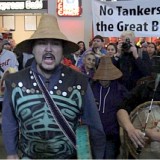I do not pretend for a second to know what is on the mind of First Nations leaders who have been skeptical of “Crown-First Nations” meetings such as took place this past Friday and the follow-ups currently being scheduled. Leaders like Union of BC Indian Chiefs’ Grand Chief Sewart Phillip and chiefs from Manitoba, Ontario and some from Saskatchewan have chosen to sit this latest round of talks out. Nor do I know what would change their minds on attending future conferences.
I do pretend to know something about politics.
National Assembly (AFN) Chief Shawn Atleo is a controversial political leader and how else could it be? His Assembly is supposed to represent First Nations throughout the nation. He doesn’t in real life and that is to be expected. His leadership is constantly in question – particularly from members of the “grassroots” Idle No More movement. This pressure has apparently taken its toll, as following Friday’s meeting, Atleo announced he was going on a “brief” sick leave.
On the other hand, while Stephen Harper doesn’t have every Canadian behind him, by reason of our “first past the post” system, he is a dictator so long as he is Prime Minister. Right from the get-go that makes conferences between the two parties difficult unto impossible.
The concerns of each band of First Nations not only are inconsistent with one another, how could that be otherwise?
Here are some facts:
- Total Aboriginal population of BC: Approximately 200,000
- Total number of Indian bands in BC: Approximately 200
- Total number of eligible B.C. First Nations/Indian bands in the treaty process: 116
To complicate matters, most nations or regions have unique languages and dialects.
At the root of claims is land and these claims differ from band to band within BC, let alone within the country. Some land claims have been disposed of by treaty (often unfairly), while in BC, the vast majority are not under treaty and are subject to land claims being dealt with at a glacial pace. Moreover, many First Nations want nothing to do with the process.
The situation reminds one of Israel, where an Israeli government can claim it wants to settle borders with Palestinians yet continues to build on land which is part of the pre-1967 land owned by Palestinians. With First Nations, the BC and Canadian governments are permitting development of Indian land without a by-your-leave.
Again, while I have no insight into all the considerations of BC First Nations, let me tell you what I would feel if I was in Grand Chief Phillip’s mind or that of any BC chief’s position.
I would refuse to deal with Federal Minister for Indian and Northern Affairs and Northern Development John Duncan, who has consistently supported salmon farms, which many coastal First Nations vehemently oppose. His presence is like the red flag to the bull.
I would refuse any part of a meeting with the Feds until that part of the past budget that took away from protection of fish habitat is repealed.
There would be no parley until both the provincial and federal governments stopped approving of fish farms and mandated a removal to land of all existing farms.
I would demand both levels of governments respect the clearly stated position of Treaty 8 First Nations in northeast BC, who oppose Site C dam based on their treaty rights.
Similarly I would demand an immediate moratorium of all proposed pipelines until all Native claims are settled and I would demand that all tanker traffic – be it from Prince Rupert, Kitimat or Vancouver Harbour – be banned by legislation.
I would require that the recommendations of the Cohen Commission Report put in place immediately.
Finally, I would require any environmentally objectionable project be put to local residents as to the need for them in the first place and that this be done before any environmental hearings take place.
These gestures and actions would be a condition precedent to any parley with the feds.
Why would any BC Chief be bound to accept any resolutions unless they are consistent with their needs, desires and historical claims?
The meeting which was just held and is supposed to reconvene seeks to find a one-size-fits-all, whether specifically or in principle. Why should Grand Chief Phillip, who has a mandate to deal with BC matters, accept a conference which by its nature seeks solutions on a one-size-fits-all basis?
It’s not parochial to point out that decisions will cater to larger populations with the powers of persuasion they possess.
Given the obvious lack of interest by the Harper and Clark governments in the basic concerns of BC First Nations, it would be folly for local leaders to enter a process in which they have little to gain and a great deal to lose.

